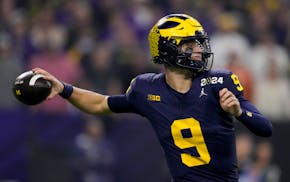What is most certain about brain injuries in football is that many of the people who talk about it will make you want to test them for similar ailments.
After 49ers linebacker Chris Borland announced his retirement at the age of 24 because of concerns about the dangers of football, Arkansas coach Bret Bielema tried to link Borland's decision to Bielema's complaints about no-huddle offenses; and "Dr.'' Joseph Maroon, who is paid by the NFL, said that football has never been safer.
"Dr.'' Maroon, who apparently interned for Dr. Nick on "The Simpsons," even said that youth football is safer than riding a bike or skateboard. This is true in some circumstances. For example, it is safer to play in the NFL than it is to ride a bike or skateboard directly toward a large group of men in the Middle East holding up a sign reading "ISIS.''
Because nationwide overreaction accompanies any NFL story of note, Borland has been characterized as everything from a quitter to a hero. He is neither.
Borland made a mature decision. He rejected the lure of money and fame in favor of health. He is no more a quitter than someone who leaves a coal mine for a cubicle.
His decision doesn't meet the dictionary definition of "brave," either. Bravery is what will be displayed by athletes who know what Borland knows about brain trauma and decide to play anyway.
Football is popular because it is the most spectacular of blood sports. Because NFL players eagerly place themselves in harm's way on every play.
Borland may be the first of a wave of players who opt out of a brutal sport for intelligent reasons. They will be replaced by those without better options in life, and those who measure football risk the way others might measure the risks of smoking, drinking or consuming sugar.
Football players will sign up for all the NFL offers, and threatens, for the same reasons people still join the military after watching "Saving Private Ryan."
For some, the choice offers a chance to prove bravery. Others have no better options.
Knowing what we all know about football's popularity, we shouldn't rush to believe that Borland's decision will lead to an exodus.
Since Watergate, the defining phrase of American life has been "Follow the money.''
No matter how many mothers bar their kids from playing the sport, football will endure because the NFL makes lots of money, and pays lots of money.
Borland's retirement may hurt the San Francisco 49ers. It won't damage the league.
Dozens of quality NFL players have had their careers ended by injuries. NFL TV ratings have not dropped.
There are plenty of good football players in the United States, there are more in Canada, and the population continues to grow. Training methods and nutrition are constantly improving, and recruiting is more sophisticated than ever, and there are thousands of college football players from which to choose.
There will always be players willing to risk their brains in exchange for the lifestyle afforded NFL players. And there's nothing wrong with that if the player understands those risks.
When the NFL deceived its own players about the risks of playing football, while paying them and treating them poorly, that was an act of evil. Too many players risked their lives, or at least the quality of their lives, for a megalomaniacal corporation that disregarded their health.
Now players can factor the risks on their own sliding scales.
Everyone knows the risks of alcohol and drug abuse, of driving fast, of eating unhealthy foods, of consuming too much caffeine. Whether awareness of such risks modifies your behavior is a personal decision, and it seems every week a new, high-alcohol-content craft brewery opens for business somewhere near you.
For the poor and the desperate, the foolhardy and the brave, the NFL will remain a goal.
After you congratulate Borland on a mature decision, please display similar admiration to those who are willing to risk their brains for what they believe will be a better life.
Jim Souhan's podcast can be heard at souhanunfiltered.com. On
Twitter: @SouhanStrib. • jsouhan@startribune.com

Souhan: Now that's a playoff atmosphere, Minnesota!

Souhan: Should Vikings even consider McCarthy in NFL draft?

Souhan: NAW erases Suns' lead, Game 1 advantage with big performance

Souhan: This is KAT's chance to prove Flip Saunders was right

